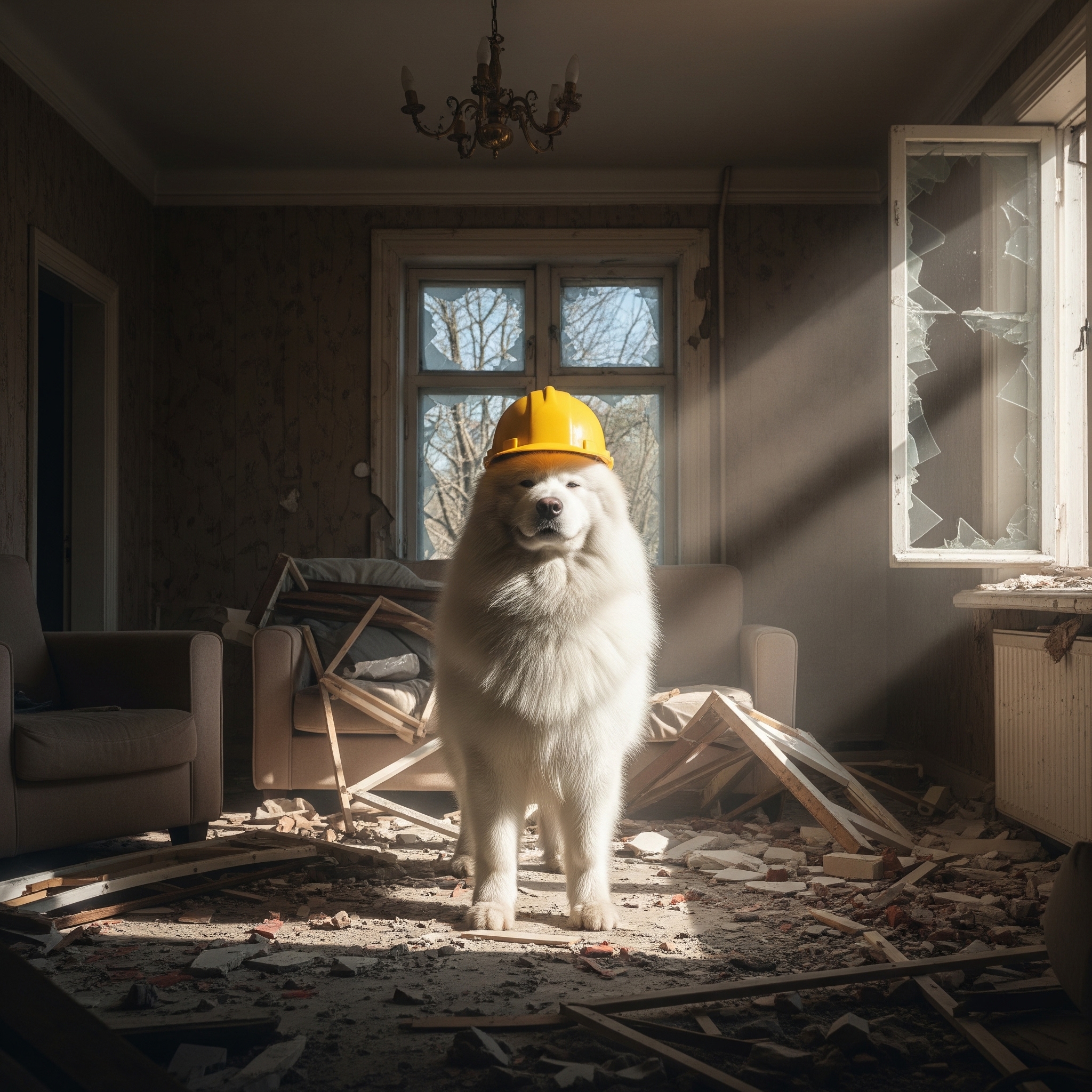The Great Couch Deconstruction:
Why Your Dog Needs a Mission, Not Just Manners
I’ve seen it all in my years as a Pack Ranger. The confetti of what was once a pillow. The skeletal remains of a designer shoe. And yes, the Great Couch Deconstruction. It’s that moment you walk into your living room and discover your beloved companion has officially graduated with a major in demolition and a minor in stuffing distribution.
It’s a moment where you love your dog, but you really, really don’t like them.
If you’re reading this, you might know the feeling. But I’m here to tell you something important: your dog isn’t a bad dog. They’re not malicious. That deconstructed couch is not an act of spite; it’s a symptom. It’s a desperate, fluffy, foam-filled cry for help. Your dog isn’t a demolition expert by choice; they’ve appointed themselves to the job because the one they truly need is missing. This guide is about understanding why, and how to give them a better role.
Part 1: Why Your Dog Appointed Himself Head of Demolitions
Before you can rebuild your living room (and your relationship), you have to understand the “why.” Destructive behavior almost always stems from a few core issues.

- Boredom and Unspent Energy: This is the number one culprit. We expect urban dogs to be content with a quick stroll around the block, but their minds and bodies are built for so much more. A bored dog will find a job to do, and unfortunately, “disembowel the sofa” can seem like a fantastic project. This is how the “couch pup” is born—a dog whose physical and mental needs are so chronically unmet that they resort to freelance interior redesign.
- Anxiety and Stress: For many dogs, destruction is a coping mechanism. Separation anxiety, fear of city noises, or the stress from a revolving door of different dog walkers can manifest in chewing and shredding. It’s a physical outlet for their emotional turmoil.
- A Communication Breakdown: Your dog is trying to tell you something. They’re trying to say, “I’m bored,” “I’m scared,” or “I have so much energy I could run to Queens and back.” Since they can’t use words, they use their teeth. The couch is just the messenger.
Part 2: The Blueprint for a Good Citizen (Not a Wrecking Ball)
So, how do we get from Couch Carnage to Canine Citizen? We need a blueprint for the behavior we do want. Luckily, one already exists: the American Kennel Club’s Canine Good Citizen (CGC) program.
I see the CGC not as a rigid test, but as a framework for a well-lived life. It focuses on teaching dogs the skills to be confident and calm in our human world—skills like handling supervised separation without panicking or walking politely through a crowd. A dog who has this kind of confidence doesn’t need to self-soothe by shredding a cushion. They have the resilience to handle daily life. This framework, which requires a pledge from owners to provide for their dog’s holistic well-being, is the “Canine Social Contract” in action.
Part 3: Your Guide to Reconstruction (Of Your Dog’s Life, Not the Couch)
Replacing the sofa is easy. Building a fulfilled, balanced dog takes a little more work. Here is your guide.
Step 1: Fulfill the Mission with Purposeful Activity
The single most effective way to combat destruction is to replace boredom with purpose. Your dog doesn’t need another aimless walk around the block; they need a mission. This is the core of our philosophy. Our pack excursions are intentionally structured journeys, not just walks. We lead the dogs on 90–120+ minute adventures, covering 4–7 miles through the vast, wild landscapes of Prospect Park. On winding woodland trails and alongside the calming lake, they get to engage all their senses. They burn calories, build muscle, and engage their minds. A physically and mentally tired dog is a happy dog, and a happy dog doesn’t have the time or energy to redecorate your living room.
Step 2: Re-establish the Bond with Consistency
A dog’s sense of security is built on stable relationships. If a different stranger from an app shows up every day, it can fuel the very anxiety that leads to destructive behavior. A consistent, trusted Pack Ranger who understands your dog’s unique personality builds a genuine bond. This relationship, built on positive reinforcement and trust, is the foundation for a secure and confident dog who feels safe when you’re not there.
Step 3: Learn to Speak Their Language
A great deal of canine “misbehavior” is simply miscommunication. As an owner, one of your most powerful tools is learning to read your dog’s body language. Recognizing the early signs of stress or anxiety—a tucked tail, yawning, lip licking—allows you to intervene and help your dog before their discomfort escalates into a full-blown couch-eating frenzy.
A Future Without Demolition Debris
A deconstructed couch is a symptom, not the problem. The solution isn’t about punishment; it’s about enrichment. By fulfilling your dog’s deep-seated needs for physical challenge, mental stimulation, and social connection, you address the root cause of their destructive behavior.
Our ultimate mission is to give the dogs we lead more joyful, healthy years with their human family. A calm, content, and fulfilled dog doesn’t need to chew the furniture. They’re too busy dreaming of their next adventure with the pack.

